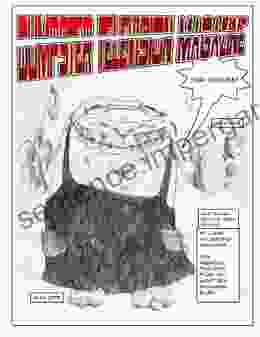How Self Interest Shapes Our Opinions and Why We Won't Admit It

Our opinions are like cherished possessions - we hold them close, defend them vigorously, and often refuse to consider any evidence that contradicts them. But what if our opinions are not as objective and rational as we believe? What if they are, in fact, shaped by our own self-interest?
This is the provocative premise of Dan Ariely's book, How Self Interest Shapes Our Opinions and Why We Won't Admit It. Ariely, a professor of behavioral economics at Duke University, argues that our opinions are not simply the product of logical reasoning and objective analysis. Rather, they are often driven by our own self-interest, even when we are unaware of it.
4.1 out of 5
| Language | : | English |
| File size | : | 7553 KB |
| Text-to-Speech | : | Enabled |
| Screen Reader | : | Supported |
| Enhanced typesetting | : | Enabled |
| Word Wise | : | Enabled |
| Print length | : | 360 pages |
Ariely provides a wealth of evidence to support his claim. In one experiment, he asked people to estimate the number of calories in a slice of cake. He found that people who were told that the cake was for themselves estimated that it contained significantly more calories than people who were told that the cake was for someone else.
This experiment demonstrates how our self-interest can bias our perceptions. When we believe that something will benefit us, we tend to see it in a more positive light. Conversely, when we believe that something will harm us, we tend to see it in a more negative light.
Our self-interest can also bias our judgments. In another experiment, Ariely asked people to evaluate a job candidate. He found that people who were told that the candidate was a member of their own social group were more likely to rate the candidate as being competent and qualified.
This experiment demonstrates how our self-interest can lead us to favor people who are similar to us. We tend to trust and believe people who share our values and beliefs, even when there is no objective evidence to support our positive assessment.
Ariely's research has important implications for our understanding of ourselves and our world. It suggests that our opinions are not as objective and rational as we believe. Rather, they are often shaped by our own self-interest, even when we are unaware of it.
This can have a significant impact on our decision-making and relationships. For example, if we are unaware of how our self-interest is biasing our opinions, we may make decisions that are not in our best interests. We may also be more likely to conflict with people who have different opinions than us, simply because we are unable to see their point of view.
So, what can we do to mitigate the effects of self-interest bias on our opinions? Ariely offers a few suggestions:
- Be aware of your own self-interest. The first step to mitigating the effects of self-interest bias is to be aware of it. When you are making a decision or evaluating something, ask yourself if your self-interest is influencing your opinion.
- Consider the opinions of others. When you are trying to make a decision, don't just rely on your own opinion. Seek out the opinions of others, especially people who have different perspectives from you. This will help you to see the issue from a more balanced perspective.
- Be open to changing your mind. If you are presented with new evidence that contradicts your opinion, be willing to change your mind. It is okay to admit that you were wrong. In fact, it is a sign of intelligence and maturity.
Mitigating the effects of self-interest bias is not easy, but it is important. By being aware of our own self-interest, considering the opinions of others, and being open to changing our minds, we can make better decisions and build more meaningful relationships.
How Self Interest Shapes Our Opinions and Why We Won't Admit It is a fascinating and thought-provoking book that challenges our assumptions about ourselves and our world. It is a must-read for anyone who wants to understand the hidden forces that shape our opinions and behavior.
4.1 out of 5
| Language | : | English |
| File size | : | 7553 KB |
| Text-to-Speech | : | Enabled |
| Screen Reader | : | Supported |
| Enhanced typesetting | : | Enabled |
| Word Wise | : | Enabled |
| Print length | : | 360 pages |
Do you want to contribute by writing guest posts on this blog?
Please contact us and send us a resume of previous articles that you have written.
 Book
Book Novel
Novel Page
Page Chapter
Chapter Text
Text Story
Story Genre
Genre Reader
Reader Library
Library Paperback
Paperback E-book
E-book Magazine
Magazine Newspaper
Newspaper Paragraph
Paragraph Sentence
Sentence Bookmark
Bookmark Shelf
Shelf Glossary
Glossary Bibliography
Bibliography Foreword
Foreword Preface
Preface Synopsis
Synopsis Annotation
Annotation Footnote
Footnote Manuscript
Manuscript Scroll
Scroll Codex
Codex Tome
Tome Bestseller
Bestseller Classics
Classics Library card
Library card Narrative
Narrative Biography
Biography Autobiography
Autobiography Memoir
Memoir Reference
Reference Encyclopedia
Encyclopedia James R Foreman
James R Foreman James F Masterson
James F Masterson James Downey
James Downey Jay M Templin
Jay M Templin Jason Miller
Jason Miller James Gacek
James Gacek Jane Mattes
Jane Mattes Jannah Firdaus Mediapro
Jannah Firdaus Mediapro Jason Thompson
Jason Thompson Jeff Burkhart
Jeff Burkhart Jayaprakash Vellila
Jayaprakash Vellila Janie Mcgee
Janie Mcgee James Kelly
James Kelly James Valentine
James Valentine Janice Nix
Janice Nix James D Burrington
James D Burrington Jane Dunnewold
Jane Dunnewold Jeannette Grunhaus De Gelman
Jeannette Grunhaus De Gelman Jane Thurnell Read
Jane Thurnell Read Janet Afary
Janet Afary
Light bulbAdvertise smarter! Our strategic ad space ensures maximum exposure. Reserve your spot today!
 Haruki MurakamiFollow ·19.4k
Haruki MurakamiFollow ·19.4k Allen GinsbergFollow ·16.2k
Allen GinsbergFollow ·16.2k Bo CoxFollow ·19.3k
Bo CoxFollow ·19.3k Joe SimmonsFollow ·8.5k
Joe SimmonsFollow ·8.5k Jerry WardFollow ·13.3k
Jerry WardFollow ·13.3k Phil FosterFollow ·18.9k
Phil FosterFollow ·18.9k Douglas FosterFollow ·8k
Douglas FosterFollow ·8k Jake CarterFollow ·19.8k
Jake CarterFollow ·19.8k

 Jacob Foster
Jacob FosterPrinciples and Persons: The Legacy of Derek Parfit
Derek Parfit's 1984 book,...

 Leo Mitchell
Leo MitchellPartners For Life: Raise Support For Your Missionary Work...
Are you a missionary or ministry leader...

 Blake Kennedy
Blake KennedyOn Desperate Ground: A Gripping Account of World War II's...
Hampton Sides' "On...

 Duane Kelly
Duane KellyCriminal Minds Sociopaths Serial Killers And Other...
In the realm of criminology,...

 Craig Blair
Craig BlairHome Repair: The Ultimate Guide to Fix, Maintain, and...
Welcome to the...

 Elmer Powell
Elmer PowellThe Organic Grower Guide to Mycorrhizae Science for...
Unlock the Secrets of Soil...
4.1 out of 5
| Language | : | English |
| File size | : | 7553 KB |
| Text-to-Speech | : | Enabled |
| Screen Reader | : | Supported |
| Enhanced typesetting | : | Enabled |
| Word Wise | : | Enabled |
| Print length | : | 360 pages |












